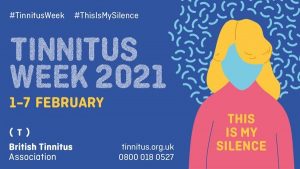February 1, 2021, by Adele Horobin
Tinnitus Week 2021
What is tinnitus?
Tinnitus is sound that is perceived internally and does not come from any outside source. It could be sensed as ringing, buzzing, hissing, whooshing, whining or sometimes even musical noises.
Tinnitus Week 1st to 7th February 2021
This year, Tinnitus Week runs from 1st to 7th February. The theme for 2021 is about accessing treatment and support – getting the right information at the right time, from the right place. The British Tinnitus Association are running free online events – book your place now.
Improving treatment and support for children with tinnitus
We know that accessing treatment and support may not always be easy. This is especially so for children. Studies indicate that tinnitus in children is common but it is still relatively unrecognised and under-researched. Tinnitus treatments and specialist services for children are not as developed as they are for adults. Tinnitus is an individual and subjective experience – it differs between people and it is hard to measure. Health care providers therefore often use clinical questionnaires, where they ask the patient a series of questions to help understand the severity of the problem and what treatments might help. However, the questionnaires available are not suitable for children. Our British Tinnitus Association-funded PhD student, Harriet Smith has been working to develop a valid questionnaire measure of tinnitus impact in children. You can find out more about her research in Issue 15 of the Audacity magazine and her British Tinnitus Association blog post. We have also highlighted tinnitus in children in one of our Ear Facts webpages.
 Ear Facts
Ear Facts
To learn about all aspects of sound and hearing, and try some activities, visit our brand new Ear Facts webpages. We are adding to these pages as we go, so keep a look out for new features!
Tinnitus research at Nottingham
As well as Harriet’s study, we have a whole team of researchers and students who are investigating different aspects of tinnitus, understanding more about the types of tinnitus, causes and appropriate treatments. See more at the Nottingham Biomedical Research Centre website and University of Nottingham Hearing Sciences webpages. We have contributed to international collaborations too such as the European School for Interdisciplinary Tinnitus Research (ESIT) and the TINNET network: An Action for Better Understanding the Heterogeneity of Tinnitus to Improve and Develop New Treatments. We continue with our international collaborations. You can listen to a 2020 British Tinnitus Association podcast of our Biomedical Research Centre tinnitus theme lead and current Chair of the British Society of Audiology, Dr Derek Hoare.
COVID-19 and tinnitus
Tinnitus can be worsened by stress and anxiety so the pandemic has brought added difficulties. The British Tinnitus Association have published Covid-19 guidance for people with tinnitus. Broader COVID-19 guidance also available.

I have regular Tinnitus, i am happy to help with research on my ears.
Hi Colleen, thank you for your interest in research. We do have a participant database, which you’d be welcome to join. You can sign up online at: https://tinyurl.com/y6klr9uw. Thank you.
All signed up and done 🙂
Thanks Colleen! 🙂